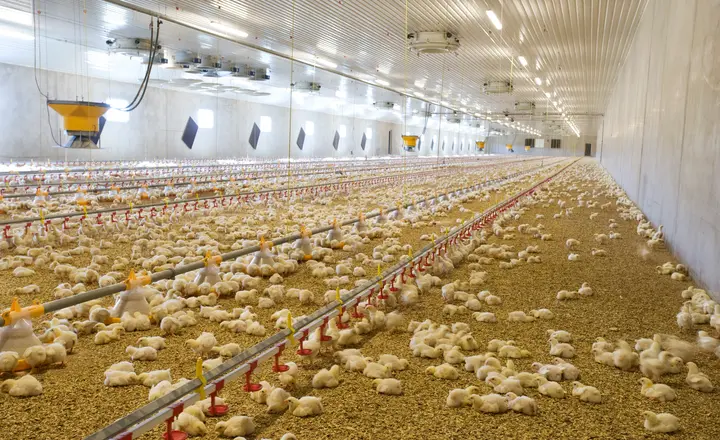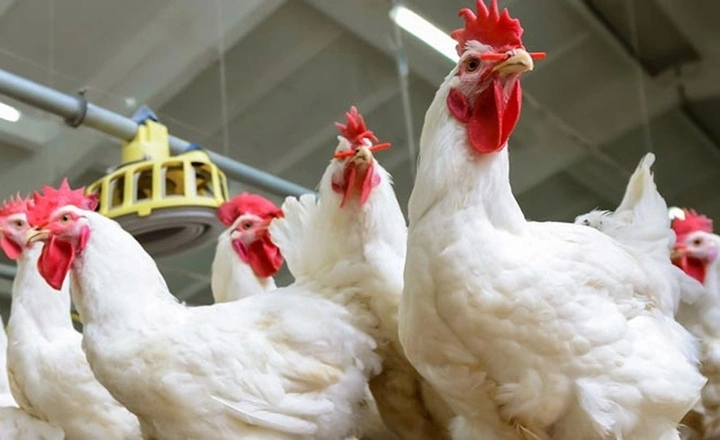Walking into a bustling poultry farm and the air filled with the sound of clucking and the smell of fresh hay. You gaze out at a sea of fluffy yellow chicks, their tiny beaks pecking away at their feed.
As you watch them grow and develop into plump, healthy broilers, you can’t help but wonder that How Many Bags of Feed For 100 Broilers to make them market weight? The answer may surprise you that it’s estimated that each broiler will consume around 4.25 kg of feed from the day they hatch until they reach 8 weeks old.
How Many Bags Of Feed For 100 Broilers?
You would typically need around 17 bags of feed to sustain them from day old to 8 weeks for 100 Broilers. This calculation is based on an average consumption rate of 4.25 kg per broiler during this period.
It’s advisable to be prepared with a range of 20-25 bags to account for any variations in appetite or growth rates among the flock.
The feeding regimen for broilers typically involves two main types of diets: the Broiler Starter Diet and the Broiler Finisher Diet.
Starter Diet with a higher protein content of 23-24% and energy level of 3190 kcal/kg, is usually given in the initial 3-4 weeks.
The Finisher Diet contains slightly lower protein at 20-21% but higher energy at 3300 kcal/kg and is fed from around the fourth week until they reach market age. Balancing these diets correctly is crucial for ensuring optimal growth and health in your broiler flock.
Broiler Starter Mash For 100 Broilers
It is indeed a crucial component of the diet for young chickens, providing them with essential nutrients and promoting healthy growth. The high protein content in the Pre-Starter diet helps support muscle development and health of the birds.

It is important for poultry farmers to closely monitor the consumption of starter mash by their broilers, as proper nutrition in the early stages can have a significant impact on growth rates and overall performance.
By following recommended feeding guidelines and providing a balanced diet, farmers can optimize the health and development of their broiler flock during the critical first few weeks.
The inclusion of antibiotics can help prevent common poultry diseases, ensuring a higher survival rate among the broilers.
Broiler Finisher Mash
Broiler finisher mash plays a crucial role in the growth and development of poultry birds, particularly broilers. As broilers reach market weight around 8 weeks old, their dietary requirements change to support muscle growth and weight maintenance.
It is essential for poultry owners to transition from starter diet to finisher diet between 4-10 weeks of age to ensure optimal nutrition for the broilers.
The feed conversion ratio is a key factor in determining the efficiency of broiler production. With an average feed conversion ratio of 2:1, broilers can gain 1 kg of weight for every 2 kg of feed consumed.
This information is vital for farmers when calculating the quantity of finisher mash needed for a specific number of broilers, ensuring proper management of resources and optimal growth outcomes for the birds.
How Many Pounds of 20-22% Feed Required For 100 Broilers?
The amount of 20-22 feed required for 100 broilers can vary based on factors such as gender and age. In the case of a flock consisting of 50 male and 50 female broilers, the approximate total amount needed would be around 669.85 pounds.
This estimation is derived from typical body weight and feed requirement charts commonly used in poultry farming.
It’s important to consider the specific needs of each gender when calculating feed requirements for broilers to ensure optimal growth and health.
How Long do Broilers Take to Mature?
Broilers typically take around 35-42 days to reach the market weight of 1.5 KG, at which point they are ready to be sold. Many poultry farmers prefer to wait until the broilers are around 8-10 weeks old before selling them.

This extended period allows the broilers to reach their full potential in terms of size and quality, resulting in a more profitable sale for the farmers.
During this maturation period its important for farmers to provide proper nutrition, housing, and care for the broilers to ensure their health and growth.
Regular monitoring of their weight and overall condition is also crucial in determining the optimal time for selling them.
How Long can Broilers Survive Without Feed?
Broilers can surprisingly survive several weeks without food, but they cannot go many days without access to water.
Feed is essential for their growth and development, as it provides the necessary nutrients and ingredients for them to grow bigger and heavier.
From the time they are day-old chicks until maturity, a flock of 100 broilers can consume around 425 kg of feed, which is approximately equivalent to 17-25 bags.

It is crucial to ensure that broilers have a constant supply of feed and water to support their growth and overall health. Without adequate nutrition, broilers may not reach their full potential in terms of size and weight.
Conclusion
Determining How Many Bags of Feed For 100 Broilers is essential for efficient poultry farming operations. By calculating the daily feed requirements per bird and adjusting for factors such as age, weight, and breed, farmers can ensure optimal growth and health in their broiler flock.
It is important to consider variations in feed consumption based on environmental conditions and feed quality to avoid underfeeding or overfeeding the birds.
Regular monitoring and adjustment of feeding strategies can help maximize growth rates and reduce feed waste, ultimately leading to improved profitability in the poultry business.
FAQs
How many kg is a bag of poultry feed?
The weight of a bag of poultry feed can vary depending on the brand and type of feed. A standard bag of poultry feed weighs around 20 to 25 kilograms.
What foods increase egg production in chickens?
There are several foods that can help increase egg production in chickens. The most important nutrients for egg-laying hens is protein, so feeding them a high-quality layer feed with around 16-18% protein content is essential.
What chicken lays 350 eggs a year?
The chicken breed that is known for laying around 350 eggs a year is the Rhode Island Red.
